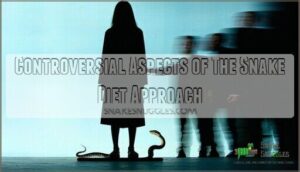This site is supported by our readers. We may earn a commission, at no cost to you, if you purchase through links.

This extreme fasting approach, promoted by Cole Robinson, combines dangerous 24-48 hour fasts with harsh, shame-based messaging that treats weight loss as a moral failing rather than a health journey.
You’ll find the community culture amplifies weight stigma through aggressive language and unrealistic expectations, making it especially damaging for those already struggling with body image issues.
While proponents claim rapid results through extended fasting and electrolyte drinks, nutrition experts warn this extreme calorie restriction lacks scientific backing and can trigger disordered eating patterns.
The diet’s approach normalizes both physical deprivation and emotional abuse—neither sustainable nor healthy long-term solutions, promoting an unhealthy relationship with food and the body.
Table Of Contents
- Key Takeaways
- Snake Diet: Extreme Fasting for Rapid Weight Loss
- Snake Juice: The Essential Electrolyte Drink
- Controversial Aspects of The Snake Diet Approach
- Fat Shaming and The Snake Diet Community
- Alternatives to The Snake Diet for Weight Management
- Frequently Asked Questions (FAQs)
- What is the Snake Diet for weight loss?
- What is the Snake Diet drink?
- What is a snakes diet plan?
- How does the Snake Diet affect muscle mass?
- Can the Snake Diet lead to eating disorders?
- Is the Snake Diet safe during pregnancy?
- How does exercise fit into the Snake Diet?
- Are there long-term studies on Snake Diet effectiveness?
- Is the Snake Diet safe for diabetics?
- Can pregnant women follow the Snake Diet?
- Conclusion
Key Takeaways
- You’re risking serious health problems with the Snake Diet’s extreme 24-72 hour fasts, which can cause nutrient deficiencies, muscle loss, and dangerous electrolyte imbalances that outweigh any short-term weight loss.
- The diet’s fat-shaming culture creates lasting psychological damage through harsh language and shame-based motivation that can trigger disordered eating patterns and destroy your relationship with food and body image.
- There’s zero scientific evidence supporting the Snake Diet’s long-term effectiveness, making it an unproven approach that nutrition experts and healthcare professionals widely criticize as dangerous.
- You’ll find better results with sustainable alternatives like balanced intermittent fasting, evidence-based nutrition, and body-positive approaches that support your mental health while achieving lasting weight management.
Snake Diet: Extreme Fasting for Rapid Weight Loss
If you’re considering the Snake Diet for quick weight loss, you’re looking at one of the most extreme fasting protocols available today.
This controversial approach promises rapid results through prolonged fasts of 24-72 hours, but the potential risks far outweigh any short-term benefits you might see on the scale.
48. hour Initial Fast With Snake Juice
The Snake Diet kicks off with an intense 48-hour initial fasting period that’ll test your willpower.
You’re allowed only Snake Juice, Cole Robinson’s electrolyte beverage containing water, salt, and potassium chloride to maintain electrolyte balance.
This extreme fasting approach forces your body into ketosis while risking dizziness, fatigue, and fasting risks like nutrient depletion before any re-feeding strategy begins.
1. 2 Hour Eating Window With High-fat Foods
Your post-fast feeding window becomes a high-stakes nutritional sprint.
High-fat choices like avocados and fatty meats dominate your plate during this brief 1-2 hour period. While these foods trigger strong satiety signals and support the ketogenic diet approach, cramming adequate nutrients into such a narrow timeframe creates serious challenges.
The one meal a day approach, similar to the Snake Diet, concentrates all daily calories into a single eating occasion.
Food quality matters tremendously when you’re basically eating one meal every few days, yet this extreme fasting pattern makes meeting basic nutritional needs nearly impossible.
Repetitive Cycles of 24-48 Hour Fasts
Once you complete your brief eating window, you’re thrust back into the relentless cycle of 24-48 hour fasts.
This toxic diet pattern creates a punishing rhythm that wreaks havoc on your body’s natural processes.
The extreme fasting approach disrupts hormonal changes, making exercise compatibility nearly impossible.
Your metabolic impact becomes increasingly unstable as you bounce between starvation and refeeding strategies.
Fasting adaptation never truly occurs because your body can’t establish equilibrium.
This snake diet methodology promotes rapid weight loss through deprivation, often accompanied by fat shaming rhetoric that makes the psychological burden even heavier.
Ketosis and Fat-burning Metabolic State
Extended fasting transforms your body into a metabolic powerhouse, forcing it to burn stored fat for fuel.
When you deprive yourself of food for days, your metabolism undergoes dramatic changes:
- Ketosis Benefits kick in as your liver produces ketone bodies from fat stores
- Fasting Adaptation occurs, with metabolism slowing to conserve energy
- Energy Levels fluctuate wildly, causing fatigue and brain fog
- Exercise Performance plummets due to depleted glycogen stores
While ketosis can promote fat loss, this extreme approach comes with serious risks.
Your body isn’t designed for such prolonged deprivation. Maintaining proper electrolyte balance is essential to avoid complications like muscle cramps.
Electrolyte Balance During Extended Fasting Periods
While your body enters ketosis, electrolyte balance becomes a tightrope walk.
The snake diet’s extreme fasting periods can trigger sodium imbalance and potassium deficiency, leaving you dizzy and weak.
Though Snake Juice contains high sodium concentration, it can’t prevent magnesium levels from dropping or eliminate dehydration risks.
This electrolyte beverage falls short of maintaining proper sodium intake during prolonged fasts.
Consider safer Snake Juice alternatives before risking your health.
Snake Juice: The Essential Electrolyte Drink
If you’re following the Snake Diet, you’ll hear a lot about Snake Juice, a homemade electrolyte drink meant to keep your body balanced during long fasts.
It’s not exactly gourmet, but understanding what’s in it—and why—can help you stay safer if you’re considering this approach to using Snake Juice.
Water, Salt, and Potassium Chloride Mixture
During extended snake diet fasting periods, your body desperately needs electrolyte balance to prevent dangerous dehydration.
Snake Juice combines three essential ingredients:
- Water – your foundation for proper hydration benefits
- Himalayan pink salt – provides vital sodium levels (though excessive amounts)
- Potassium chloride – balances electrolytes but impacts kidney function
While DIY recipes for this electrolyte beverage seem simple, the high sodium intake poses serious kidney impact risks.
Each packet contains over 1,000mg sodium – nearly half your daily limit in one drink.
Baking Soda and Magnesium Sulfate Additives
Snake Juice’s baking soda and magnesium sulfate (Epsom salt) additives aim to prevent electrolyte imbalance during extended fasting.
However, DIY risks lurk beneath the surface. Dosage concerns around these ingredients can trigger serious side effects.
It’s designed to be an ultimate electrolyte drink for hydration.
| Component | Function | Risk |
|---|---|---|
| Baking Soda | pH balance | Bloating, nausea |
| Magnesium Sulfate | Muscle support | Diarrhea, cramping |
| High Sodium | Fluid retention | Blood pressure spikes |
| DIY Mixing | Cost savings | Measurement errors |
| Extended Use | Electrolyte drink | Kidney strain |
Hydration and Mineral Replenishment During Fasting
During prolonged fasting periods, your body faces serious Dehydration Risks that go beyond simple thirst.
Snake Juice acts as an electrolyte beverage designed to combat Electrolyte Imbalance, but the risks remain significant.
This mixture of Himalayan pink salt and potassium chloride attempts to replace lost electrolytes, yet concerns about excessive Sodium Intake persist.
While Snake Juice provides some Mineral Sources, it can’t fully compensate for the extreme stress fasting places on your system.
Here’s what prolonged fasting does to your body:
- Depletes essential electrolytes through increased urination
- Creates dangerous mineral deficiencies affecting heart function
- Triggers severe dehydration despite consuming Snake Juice
- Forces your kidneys to work overtime processing excess sodium
DIY Snake Juice Recipe and Preparation
Mixing up your own Snake Juice can feel like a science project. Grab water, Himalayan pink salt, potassium chloride, baking soda, and Epsom salts—double-check your Ingredient Sourcing for quality.
Use precise Mixing Methods, as too much of anything can taste like a chemistry lab gone wrong. Chill your electrolyte beverage for better Taste Improvement, and stash it in the fridge for simple Storage Solutions.
Consider quality ingredients for best results. Hydration Timing matters—sip thoughtfully!
Recommended Consumption During Fasting Periods
You’ve mixed your Snake Juice—now let’s discuss consumption guidelines during your fasting periods.
While proponents claim this electrolyte beverage supports Hydration Strategies, the snake diet’s approach raises serious concerns about Micronutrient Needs and safety.
Here’s what Snake Diet followers typically recommend:
- Daily intake: 2-3 liters of Snake Juice containing Himalayan pink salt and potassium chloride
- Supplement Timing: Sip throughout fasting periods rather than chugging large amounts
- Electrolyte Balance: Monitor for dizziness or cramping as warning signs
- Individual variation: Adjust based on body size and activity level
However, this extreme approach ignores proper medical supervision for extended fasting.
Controversial Aspects of The Snake Diet Approach
While you might assume extreme weight loss methods produce lasting results, the Snake Diet’s approach raises serious red flags among healthcare professionals.
The diet’s severe calorie restriction, lack of scientific backing, and potential to trigger disordered eating patterns make it a controversial choice that experts warn against.
Extreme Calorie Restriction and Potential Health Risks
Even a few weeks of extreme fasting can trigger serious health complications.
The snake diet’s severe calorie restriction creates a perfect storm for your body’s systems to malfunction, leading to consequences that extend far beyond temporary discomfort.
- Nutrient deficiencies develop rapidly, affecting everything from immune function to wound healing
- Muscle loss accelerates during prolonged fasts, causing metabolic slowdown that makes future weight management harder
- Organ damage can occur when your body breaks down muscle tissue for energy, stressing kidneys and liver
- Eating disorders often emerge from extreme restriction patterns, creating unhealthy relationships with food
- Rapid weight loss primarily consists of water and muscle, not sustainable fat reduction
Note: Since there was only one main concept group with a list of related ideas, the double newline was added after the introductory sentences to separate the main concept from the detailed list of potential health complications.
Lack of Scientific Evidence Supporting Long-term Efficacy
The snake diet operates without scientific backing, relying on unsupported claims rather than rigorous research.
Limited research exists on extreme fasting’s long-term studies effectiveness for sustainable results.
This lack of qualifications from its creator compounds concerns about unproven claims and fatshaming tactics.
| Research Type | Snake Diet Status | Health Impact |
|---|---|---|
| Peer-reviewed studies | None available | Unknown risks |
| Long-term data | Missing entirely | Potential harm |
| Clinical trials | Not conducted | Safety unclear |
| Expert validation | Widely criticized | Red flags raised |
| Nutritional analysis | Inadequate evidence | Deficiency concerns |
Criticism From Nutrition Experts and Healthcare Professionals
Healthcare professionals have sounded alarms about the snake diet’s dangerous approach to weight loss.
Expert concerns center on the diet’s lack of scientific backing and potential for severe nutritional deficiencies.
The medical community warns against extreme fasting protocols that prioritize rapid results over long-term health.
- Severe nutrient deficiencies from prolonged calorie restriction
- Cardiovascular strain from destabilized blood sugar levels
- Electrolyte imbalances despite Snake Juice consumption
These health risks make sustainable alternatives far safer than embracing harmful diets rooted in diet culture and fatshaming tactics that exploit body image issues.
Potential for Disordered Eating Behaviors
Jumping into the snake diet might feel like you’re taming your hunger, but restrictive eating often backfires.
You could end up caught in a cycle of binge eating, food guilt, and social isolation.
Harmful diets like this can make you obsess over every bite, damaging your body image and relationship with food.
Disordered eating sneaks in quietly, turning what started as a quick fix into a real struggle with restrictive diets and body image issues. This can lead to developing ARFID eating disorder.
Ethical Concerns Regarding Promotion of Extreme Dieting
The promotion of extreme fasting like the snake diet raises serious ethical questions about dietary misinformation targeting vulnerable populations.
When influencers push unhealthy weight loss methods without proper credentials, they’re playing with people’s lives.
Consider these concerning patterns:
- Exploiting desperation – preying on people struggling with body image issues
- Bypassing informed consent – downplaying risks of eating disorders and psychological impact
- Amplifying fatshaming language – normalizing harmful rhetoric that damages mental health
This isn’t just bad advice; it’s potentially dangerous content dressed up as wellness wisdom.
Fat Shaming and The Snake Diet Community
If you’ve encountered the Snake Diet community online, you’ve likely witnessed the harsh language and fat-shaming tactics that define this approach to weight loss.
Cole Robinson’s aggressive messaging creates a toxic environment where shame becomes the primary motivator, potentially causing lasting psychological harm to those seeking healthier relationships with food and their bodies, characterized by a culture of fat-shaming.
Cole Robinson’s Controversial Rhetoric and Approach
Cole Robinson’s abrasive approach to weight loss promotion has sparked widespread controversy within health communities.
This self-proclaimed fasting coach regularly employs harmful language and fat-shaming language to motivate followers, creating what many experts describe as a cult-like following.
Robinson’s aggressive marketing tactics include:
- Calling followers "fat pigs" and using other derogatory terms
- Telling people to fast "until you feel like death"
- Dismissing mainstream medical advice as fraudulent
- Encouraging public shaming for "accountability"
- Promoting unqualified advice without medical credentials
His disturbing messaging frames obesity as personal failure while spreading medical misinformation about extreme fasting benefits.
This confrontational style attracts attention but raises serious ethical concerns about promoting unsafe behaviors through shame-based motivation.
Impact on Mental Health and Self-esteem
After hearing the harsh tone from the Snake Diet community, it’s easy to feel like you’re walking a mental tightrope.
The pressure to chase an impossible body image can chip away at your emotional well-being, leading to self-esteem issues and even disordered eating.
Here’s how it can show up in your daily life:
- Anxiety over every meal or snack
- Comparing yourself to others’ “success” stories
- Negative self-talk becoming a constant companion
- Using food for comfort, fueling emotional eating and body dissatisfaction
The diet’s restrictive nature can trigger ARFID eating disorders.
You deserve better than this mental rollercoaster.
Reinforcement of Weight Stigma and Discrimination
Perpetuating harmful weight stigma becomes second nature when extreme diets like the Snake Diet dominate conversations.
You’re not just restricting calories—you’re absorbing messages that equate thinness with moral superiority.
This dietary fat-shaming creates ripple effects, normalizing discrimination against larger bodies in workplaces, healthcare settings, and social spaces.
Social isolation deepens as people withdraw from food-centered gatherings, while internalized stigma convinces them they deserve judgment.
Your mental wellbeing suffers when society treats body size as a character flaw rather than embracing health at every size principles.
Intersection of Diet Culture and Fat Phobia
You can’t talk about the Snake Diet without seeing how diet culture and fat phobia go hand in hand.
Diet culture tells you thin is best, while fat bias and weight stigma push you to chase that ideal.
Social pressures and the diet industry profit from your insecurities, making body image issues worse.
The snake diet community is just another echo chamber, fueling fat phobia instead of encouraging body positivity or real, lasting health.
Alternatives to The Snake Diet for Weight Management
If you’re looking for sustainable weight management, you don’t need the Snake Diet’s extreme approach.
Evidence-based alternatives focus on gradual changes that support your physical and mental health without the risks of prolonged fasting or toxic messaging.
Balanced, Sustainable Approaches to Intermittent Fasting
While extreme fasting methods like the Snake Diet can harm your body, gentle fasting offers a sustainable approach to weight management.
Gradual adaptation helps your body adjust naturally, making lifestyle integration easier and more effective for sustainable weight loss.
Consider these balanced approaches:
- 16:8 method – Fast 16 hours, eat within 8 hours daily
- 5:2 pattern – Normal eating 5 days, moderate restriction 2 days
- Alternate day fasting – Switch between regular and low-calorie days
Evidence-based Nutrition and Exercise Recommendations
Rather than starving yourself with extreme approaches, scientific evidence supports a balanced approach combining nutritious whole foods with regular exercise.
Work with a registered dietitian to create realistic goals and sustainable habits. Exercise science shows that consistent movement paired with adequate nutrition delivers lasting results.
Consider evidence-based strategies for peak health. This sustainable approach with professional guidance beats dangerous fasting every time.
Body-positive Health and Wellness Strategies
Body-positive approaches shift focus from weight loss to overall wellbeing.
Intuitive Eating helps you trust your body’s hunger cues without restrictive rules.
Mindful Movement means choosing activities you enjoy rather than punishing workouts.
Self-Acceptance and Body Neutrality combat body dissatisfaction by appreciating what your body does, not just how it looks.
These strategies support Mental Wellness and emotional wellbeing while improving your relationship with food and exercise naturally.
Regular monitoring can also help with snake weight management.
Addressing Underlying Factors Contributing to Weight Gain
Weight gain stems from multiple interconnected factors beyond simple calorie counting.
Hormonal imbalances can disrupt your metabolism, while chronic stress management issues trigger cortisol spikes that promote fat storage.
Poor sleep quality disrupts hunger hormones like leptin and ghrelin, leading to increased appetite.
Gut health imbalances affect nutrient absorption and inflammation.
Emotional eating patterns often mask deeper psychological needs.
Unlike the snake diet’s punitive approach that worsens body dissatisfaction and disordered eating, addressing these root causes through holistic lifestyle changes supports sustainable weight management without compromising mental health or emotional health.
Importance of Professional Guidance and Medical Supervision
Three healthcare professionals can transform your weight journey from dangerous experiment to sustainable success.
Medical evaluation screens for underlying conditions, while registered dietitians create personalized plans that address eating disorders and mental health concerns.
Expert monitoring guarantees safe fasting alternatives, protecting you from dangerous diets through thorough medical supervision and evidence-based strategies.
- Medical screening reveals hidden health issues before starting any weight management program
- Personalized nutrition plans target your specific needs while preventing disordered eating patterns
- Ongoing supervision provides safety nets that dangerous diets like Snake Diet completely ignore
Frequently Asked Questions (FAQs)
What is the Snake Diet for weight loss?
Ever wondered if you could eat like a snake and still lose weight?
The Snake Diet pushes you to fast for up to 72 hours, then eat one big, high-fat, high-protein meal—definitely not your average meal plan!
What is the Snake Diet drink?
The Snake Diet drink, called Snake Juice, mixes water, salt-free potassium chloride, Himalayan pink salt, baking soda, and Epsom salt.
It’s designed to replace electrolytes during fasts—imagine a salty Gatorade, minus the sugary hugs.
What is a snakes diet plan?
Don’t put all your eggs in one basket, but the Snake Diet basically demands just that.
You’ll follow extreme fasting cycles, eating one meal every 24-72 hours while drinking electrolyte "Snake Juice" during fasts.
How does the Snake Diet affect muscle mass?
Severe calorie restriction in the Snake Diet causes muscle loss alongside fat loss.
You’ll lose lean muscle mass because prolonged fasting without adequate protein intake triggers muscle breakdown for energy, slowing your metabolism long-term.
Can the Snake Diet lead to eating disorders?
Coincidentally, restrictive eating patterns like extreme fasting can trigger disordered behaviors. You’re risking binge episodes, food guilt, and unhealthy body relationships through severe calorie restriction and fat-shaming messaging.
Is the Snake Diet safe during pregnancy?
The Snake Diet is absolutely unsafe during pregnancy. You’ll need adequate nutrition for your baby’s development, which extreme fasting prevents. Consult your healthcare provider for appropriate pregnancy nutrition guidance instead.
How does exercise fit into the Snake Diet?
Like ye olde warriors, you’d think exercise pairs with the Snake Diet, but prolonged fasting makes workouts risky, causing dizziness, fatigue, and fainting from severe calorie restriction.
Are there long-term studies on Snake Diet effectiveness?
No long-term scientific studies specifically validate the Snake Diet’s safety or effectiveness. Research on similar prolonged fasting is limited, lacking robust evidence for this extreme approach’s benefits or risks.
Is the Snake Diet safe for diabetics?
Diabetics face a 20% higher risk of dangerous blood sugar swings during extreme fasting.
The Snake Diet isn’t safe for you if you’re diabetic – prolonged fasting destabilizes glucose levels, potentially causing life-threatening complications that require medical supervision.
Can pregnant women follow the Snake Diet?
No, pregnant women shouldn’t follow the Snake Diet.
Prolonged fasting and severe calorie restriction can harm both mother and baby, potentially causing nutrient deficiencies and complications during this critical development period.
Conclusion
Like mixing oil and water, the snake diet and fat shaming simply don’t blend into a recipe for real health.
If you’ve felt pressure from these extreme methods, remember—you deserve better than crash diets mixed with guilt trips.
Cutting corners with your health rarely works long-term, and there’s no shame in seeking a path that respects both your mind and your body.
Lasting change comes from balanced habits, not quick fixes or harsh judgments, and it’s about making a choice for real health.



















